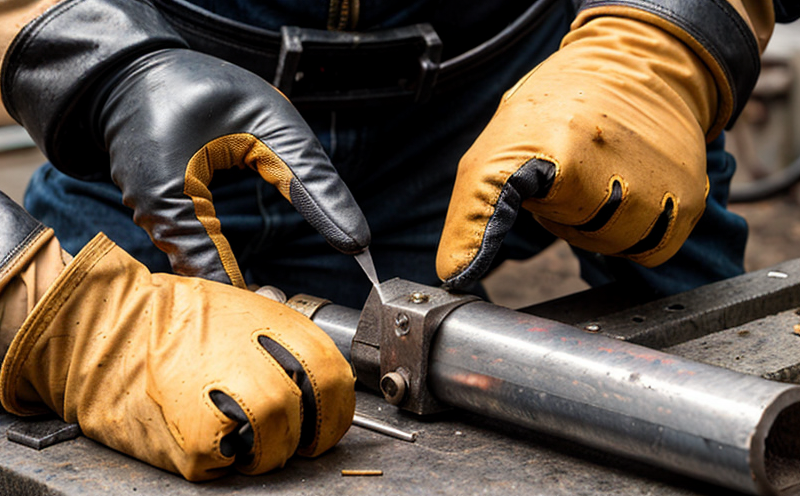Welding glove inspection
The inspection of welding gloves is a critical component in ensuring safety and compliance within the industrial sector. Welding gloves are designed to protect workers from burns, cuts, and other injuries associated with high temperatures and sharp objects encountered during welding processes. Proper inspection ensures that these gloves meet rigorous standards set by international organizations such as ISO (International Organization for Standardization) and ASTM International.
The primary purpose of inspecting welding gloves is to verify their structural integrity, material properties, and overall fit before they are used in hazardous environments. This process involves several key steps which include visual inspection, dimensional checks, tensile strength tests, heat resistance assessments, puncture resistance evaluations, flame retardancy checks, and chemical resistance verification.
Visual inspections involve examining the gloves for any visible damage such as tears, cuts, holes, or discoloration that could compromise their protective capabilities. Dimensional checks ensure that the gloves fit correctly on the hand, providing adequate coverage without being overly restrictive. Tensile strength tests measure how much force is needed to tear through a glove sample, which helps determine its durability under stress.
Heat resistance assessments evaluate the maximum temperature at which a welding glove can maintain its structural integrity and provide thermal insulation effectively. Puncture resistance evaluations test the ability of the gloves to withstand punctures from sharp objects like metal fragments or small tools used during welding operations. Flame retardancy checks confirm whether the material composing the glove will self-extinguish after exposure to flames, reducing the risk of prolonged burning.
Chemical resistance verification ensures that welding gloves can protect hands from contact with various chemicals commonly found in industrial settings, including solvents, acids, alkalis, and other hazardous substances. Compliance with relevant standards like ISO 13920-1:2016 for general requirements on protective gloves against chemical hazards is crucial here.
Regular inspections not only enhance worker safety but also contribute to cost savings by preventing premature replacements due to accidental damage or failure during use. By adhering strictly to established guidelines and using appropriate testing methods, organizations can maintain high levels of occupational health and safety across all departments involved in welding activities.
Why Choose This Test
Selecting the right inspection method for your welding gloves is essential because it directly impacts both employee wellbeing and operational efficiency within your organization. Here are some compelling reasons why choosing a professional inspection service over self-assessment could benefit you:
- In-depth knowledge. Professional inspectors possess extensive experience in identifying subtle flaws that might otherwise go unnoticed by non-experts.
- Consistency. Regular inspections conducted by trained personnel ensure uniform quality across multiple batches or types of gloves, reducing variability and potential risks.
- Expertise. They stay updated with the latest industry trends and changes in regulatory requirements, ensuring compliance with current standards and practices.
- Efficiency. Automated testing equipment used by professionals can process large quantities quickly while maintaining accuracy levels unattainable through manual means alone.
- Compliance. Ensuring adherence to international norms like ISO 13920-1:2016 guarantees that your products meet specific criteria, thereby avoiding costly penalties or recalls later on down the line.
In conclusion, investing in a comprehensive inspection program demonstrates commitment towards fostering a safer working environment and upholding high standards of craftsmanship. It ultimately leads to better outcomes for all parties involved - employees, customers, stakeholders alike.
International Acceptance and Recognition
The importance of international acceptance cannot be overstated when it comes to welding glove inspections. Organizations operating internationally must adhere to the same rigorous safety standards regardless of location. For instance, ISO 13920-1:2016 specifies general requirements for protective gloves against chemical hazards, which applies universally across borders.
Compliance with these globally recognized norms signifies that your products have met stringent quality benchmarks set by leading institutions worldwide. This recognition fosters trust among customers who rely on reliable performance from their suppliers. Moreover, it opens doors to new markets where meeting local regulations becomes an added advantage rather than a hurdle.
When conducting inspections according to these international standards, laboratories follow precise procedures that guarantee consistency and reliability in results. These include using calibrated equipment, trained personnel, standardized test methods, and documented records. Such practices ensure that every inspection adheres strictly to agreed-upon specifications, regardless of where it takes place.
Competitive Advantage and Market Impact
Investing in welding glove inspections offers numerous competitive advantages that can significantly impact your business's market position:
- Better Product Quality. Thorough inspections identify defects early on, allowing for timely corrections before they become costly issues. This results in higher quality products that satisfy customer expectations and build brand loyalty.
- Informed Decision Making. Access to accurate inspection data enables informed decisions about product design improvements or process optimizations aimed at enhancing performance and reducing costs.
- Enhanced Reputation. Demonstrating commitment to safety through regular inspections enhances your company's reputation as a responsible player in the industry. This positive image attracts more customers, partners, and investors.
- Regulatory Compliance. Ensuring adherence to international standards not only avoids legal troubles but also positions you favorably when dealing with regulatory bodies or undergoing audits.
In today’s competitive landscape, these factors contribute to sustainable growth and profitability. By prioritizing welding glove inspections, businesses can achieve a strategic edge that drives success both locally and globally.





